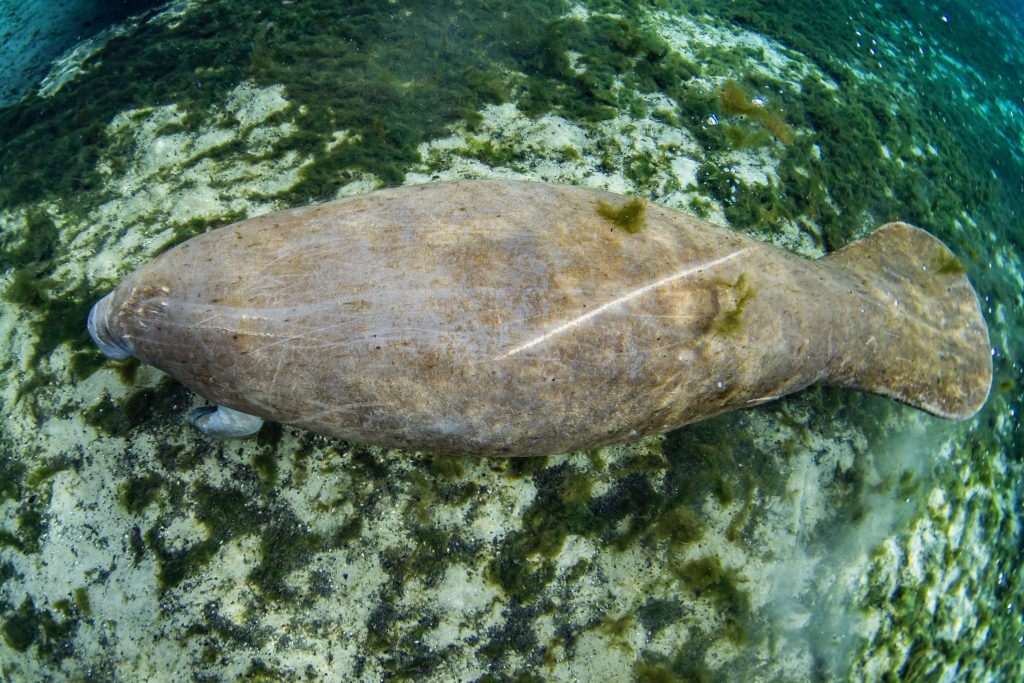Saturday marked the first day of Spring 2021, which means more and more boaters and people will be out on the water, boating, fishing and recreating — and potentially, encountering marine life. It’s important to keep coastal marine life like sea turtles, manatees and dolphins in mind when out on the water, which face threats from entanglement with fishing gear, ingesting plastic trash, boat strikes, as well as harassment.
And it’s not just the impact of injury or death that harms these animals. According to a recent study, a dolphin that’s been injured by a boat or fishing gear faces social consequences, losing some of their closest peers — for unknown reasons. (Check out an article in Hakai Magazine about this study by our research associate Bethany Augliere).

Photo by the Sarasota Dolphin Research Project, taken under NMFS Permit #20455
Unfortunately, every summer we see dolphins in the Bahamas with boat strike wounds, as well as countless balloons, marine debris, stray fishing line etc..
A reminder: Marine Mammal Protection Act
In the United States, marine mammals, like dolphins and manatees, are protected under the Marine Mammal Protection Act, which was signed into law in 1972 by President Nixon with strong bipartisan support. The act protects the animals from harm and having their natural behaviors, such as feeding, nursing, resting or mating, disrupted by humans. The act also ensures the maintenance of healthy populations and that any depleted populations are rebuilt. Sea turtles
The MMPA prohibits feeding, hunting, harassing, capturing, or killing any marine mammal or attempting to do so. These activities are referred to as a “take.” It also prohibits the import, transport, export, purchase or sale of marine mammals and their parts or products,” according to NOAA.
This is partly why you should NOT feed manatees lettuce or freshwater. Not only is it not good for them, it’s against the law. Manatees are protected under both the MMPA and the Endangered Species Act. According to the Florida Fish and Wildlife Conservation Commission, “anyone convicted of violating state law faces maximum fines of $500 and/or imprisonment of up to 60 days. Conviction for violating federal protection laws is punishable by fines up to $100,000 and/or one year in prison.”
When viewing dolphins in the wild, remain 50 years away (about half the length of a football field). This is also true for porpoises, seals and sea lions.
For large whales, remain 100 yards from large whales. Certain states have laws that are even more specific. For instance, Federal law requires vessels to remain 100 yards away from humpback whales in Hawaii and Alaska waters, 200 yards from killer whales in Washington State inland waters, and 500 yards away from North Atlantic right whales throughout U.S. waters.
Check out this list from NOAA for more viewing guidelines.
Responsible Boating
For manatees specifically, according to the Florida Fish and Wildlife Conservation Commission, approximately 25-30% of manatee deaths statewide are attributed to watercraft. In recent years, manatee deaths caused by blunt-force impacts (non-cutting) have outpaced manatee deaths caused by propeller cuts, with a small portion of the deaths/injuries attributed to both causes.

Photo by underwater photographer Nicodemo Ientile of a Florida manatee with a boat strike wound.
“If a watercraft strikes a manatee in the head, such as while the animal is taking a breath, the animal may die immediately. Strikes in other areas can result in acute injuries that quickly result in death but also can result in chronic injuries that linger for days, weeks, or longer before the manatee finally succumbs. Internal injuries, such as broken or dislocated ribs, can result in death from internal bleeding or infection.”
The FWC has a few guidelines:
- Abide by the posted speed zone signs while in areas known to be used by manatees or when observations indicate manatees might be present.
- Wear polarized sunglasses to reduce glare on the surface of the water, which will enable you to see manatees more easily.
- Try to stay in deep-water channels whenever possible.
- Avoid boating over seagrass beds and shallow areas. Manatees are often found in shallow, slow-moving rivers, estuaries, lagoons, and coastal areas.
- Remain at least 50 feet away from a manatee when operating a powerboat.
- Please don’t discard monofilament line, hooks, or any other litter into the water. Manatees and other wildlife may ingest or become entangled in this debris and can become injured or even die.
Dolphin-Friendly Wildlife Watching
We understand the desire to view these animals out in the wild. If you see dolphin or manatees out in the wild, remember to keep your distance so that you don’t disrupt natural behaviors such as feeding or mating. You never know, sometimes a curious manatee might come over and check out our kayak if your patient and motionless!
A few other notes to help these animals stay safe and protect their environment:
- Stash your trash don’t just leave it on the beach or toss it overboard. Better yet, participate in beach clean-ups, or just clean up trash that you see.
- Recycle your fishing line
- For fishing, use circle and corrodible hooks, which reduce injuries to wildlife and eventually dissolve. (It’s a myth that ALL hooks dissolve or rust out)
- Reel in your line if dolphins or manatees appear, and don’t cast toward them
- Most importantly, remember never to feed wildlife
